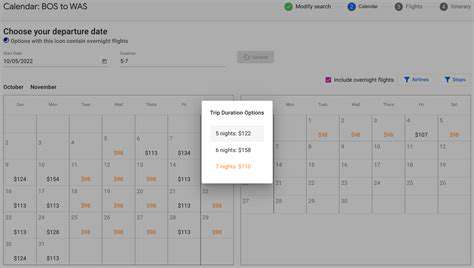Tips for Booking Accommodation on a Budget
Table of Contents
- Discover alternative search engines for diverse accommodation options
- Skillfully use meta search engines for comprehensive price comparisons
- Access different countries' booking sites for special offers
- Leverage local blogs for exclusive accommodation information
- Choose off-peak periods for bookings to enjoy price benefits
- Flexibly adjust travel dates to capture the best deals
- Make good use of comparison tools to lock in great deals
- Seize last-minute opportunities for bargain hotel rooms
- Conduct in-depth investigations of community environments to find affordable lodgings
- Try hostels to experience community culture
- Explore vacation rentals for a comfortable home-like experience
- Experience camping to enjoy the joys of nature
- Visit unique bed-and-breakfasts to experience local customs
- Try house-sitting for free accommodation
- Read guest reviews carefully to understand real experiences
- Verify facilities to ensure quality living conditions
1. Multi-dimensional Search Strategies

1. Expand Non-mainstream Search Channels
Rather than crowding around Google, try lesser-known search engines like Microsoft Bing or DuckDuckGo. These platforms often recommend eye-catching unique accommodation options, such as designer apartments hidden in residential areas or quaint family-run inns. Sometimes, changing your search entry point feels like opening the door to a new world.
For example, Bing often prioritizes accommodation recommendations that come with travel guides, and this related recommendation mechanism can often uncover a lot of niche gems. Last year in Kyoto, I found a converted machiya inn through this method, which cost only two-thirds of a chain hotel.
2. Creative Use of Meta Search Engines
Price comparison tools like Skyscanner can simultaneously gather data from over twenty platforms, including Booking and Agoda. Once, while looking for a place in Chiang Mai, I discovered that the same hotel had a price difference of 40% across different platforms, almost like a treasure hunt. The biggest advantage of this tool is saving time; you can complete what originally took two hours of price comparison in just ten minutes.
An advanced strategy is to set multiple filtering criteria: locking the rating at 8.5 or above, ensuring it is within a ten-minute walk to the subway station, and selecting options with kitchens. Last week, while helping a friend find accommodations in Paris, I used this method to filter out three super cost-effective apartments, ultimately saving nearly 200 euros.
3. Surprises in Cross-Border Price Comparisons
While booking a hotel in Iceland last year, I accidentally discovered that the German version of Booking.com had prices 15% lower than local ones. I later learned that many European hotels set exclusive offers for different country websites. Now, before making a reservation, I switch between three or four country domains like a secret agent to compare prices.
A handy tip is to keep an eye on exchange rate fluctuations. During a period of yen depreciation, I booked a ryokan in Hakone through Japan's Rakuten Travel, which ended up being 30% cheaper than booking directly. However, be cautious about payment methods, as some overseas websites may charge cross-border fees.
4. Localized Information Mining
A local forum in Bangkok once recommended houseboat accommodations along the Chao Phraya River, a type of unique lodging that can't be found through conventional searches. I later discovered that every city has such secret bases: artist lofts in Lisbon or hanok experiences in Seoul... These treasure stays usually retain the most authentic local vibe but cost only half of what you’d pay in commercial areas.
Now, whenever I arrive in a new city, I’ll first look for local blogs by breaking through firewalls. Last time in Kyoto, I found a machiya inn where I could experience making wagashi through a tea master’s blog; this unique experience is something money can’t easily buy.
5. The Timing of Booking is Key
Tuesday is my lucky day; I've repeatedly verified that booking rooms on Wednesday afternoons is the easiest way to score good deals. Once, I spontaneously decided to go to Hangzhou and found a special price for an executive room at a five-star hotel on Wednesday afternoon that was cheaper than a basic room on the weekend. Remember this mnemonic: 90 days ahead for peak season, 7 days before departure for off-peak.
Last year, during the snow season in Hokkaido, I locked in a stay at a Niseko inn three months in advance, saving 40% of my budget. Off-season travel is even more outrageous; when visiting the Maldives during the rainy season, a five-star resort went straight down to half price while it was raining, I was snorkeling in the rain anyway, so it didn't matter.
2. Flexible Travel Strategies

Understand Peak and Off-Peak Patterns
Every destination has hidden golden periods. For example, the best time to visit Phuket is actually from April to May when the rainy season hasn’t begun and tourists have dispersed; not only do hotel prices drop significantly, but you can also feel like you own the beaches. Once in May, I stayed in a villa with a private pool for 800 baht, which would cost 3000+ during peak season.
Flexibly utilizing front and back dates: prices can vary by 60% three days before and after cherry blossom season in Tokyo. Last year, I intentionally chose to go three days before the predicted full bloom, saving 50,000 yen on the hotel while the cherry blossoms still bloomed beautifully.
Tips for Catching Last-Minute Deals
Download the HotelTonight app; once while in New York, I randomly found a four-star hotel in Times Square going for $99. But to play the last-minute game well, you should be prepared: keep a toiletries bag in your suitcase and have several price comparison apps saved on your phone. This is great for spontaneous travelers; I’ve used this strategy to stay in five-star hotels worldwide, averaging less than $120.
Last week in Bangkok, I booked a designer hotel near Siam Square through lastminute.th, and the breakfast-inclusive price was 40% cheaper than what I'd find on Ctrip. The key was that upon check-in, I found I had been upgraded to an executive room, a surprise that typically wouldn’t happen with standard bookings.
Diversity of Accommodation Types
I’ve tried a study room rental in Seoul for only 300,000 won a month, including utilities; in Chiang Mai, a yoga retreat where accommodation plus classes costs less than 500 baht daily; I even stayed in a temple accommodation in Okinawa, waking up to the sound of chanting every morning—such experiences simply cannot be compared with hotels. Now, choosing accommodation feels like opening a blind box; there's always a fresh surprise.
Recently, I've become a fan of farm stays. I once stayed in a place in Taiwan where I could personally milk sheep, and I've experienced potato harvesting for accommodation in Hokkaido—this deeper travel experience makes memories come alive.
3. A Comprehensive Guide to Unique Accommodations
3.1 New Approaches to Youth Hostels
At a capsule hotel in Osaka, they equipped it with Dyson hairdryers, and a youth hostel in Kyoto offered kimono experience classes—today’s youth hostels have long broken the traditional mold. Once, I stayed at a designer youth hostel in Taipei, where the rooftop bar had a view of the 101 nightscape, and the bed fee was only 300 TWD.
It's recommended to pay attention to various themed activities at popular hostels: Seoul's Myeongdong hostel organizes Korean cooking classes every week, and the Silom hostel in Bangkok has Muay Thai experience classes. These value-added services turn accommodation into travel highlights.
3.2 Vacation Rental Pitfall Guide
While looking for accommodation on Airbnb, be sure to utilize the map filter; once, I found an entire rental apartment within 300 meters of the subway station in Osaka for only one-third of the price of hotels in Shinsaibashi. Remember this formula: walking distance outside the 10-minute circle = 30% off the price.
Always video chat for property viewing before booking: I almost got tricked by a wide-angle photo from a certain apartment in Lisbon that showed a space so small I couldn’t even open my suitcase. Nowadays, I always request real-time video showcases of bathroom facilities and kitchen appliances from hosts.
4. Discount Secrets Unveiled
4.1 Advanced Methods for Price Comparison Websites
Set up price tracking alerts on Trivago; I once successfully caught a limited-time offer at a ryokan in Kyoto. Even better, by combining it with a cashback site last year while booking in Okinawa, I combined price comparison, cashback, and credit card discounts; it ended up being like booking at 40% of the normal price.
It’s recommended to install comparison plugins to automatically display historical price trends when browsing hotel websites, easily spotting fake promotions.
5. Authentic Evaluation Identification Techniques
5.1 Sharpened Eye for Reviews
Be cautious of exaggerated reviews that claim \must-stay\; useful reviews will specifically describe sound insulation or hot water stability. Once, based on reviews, I found a hotel in Bangkok with excellent soundproofing; despite being right next to a night market, it was as quiet as a library.
I discovered a pattern: guest photographs of homemade breakfast are more realistic than those on the official site; by observing the style of the dishes, one can judge the update frequency of the hotel, a little-known fact that has helped me avoid many pitfalls.
